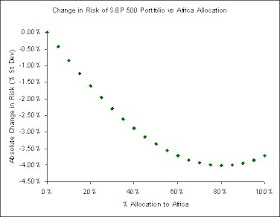This may come as a surprise to some, but including an African investment in a portfolio has the potential to reduce volatility. In fact, African markets add a new and different form of diversification within a global portfolio, which has been shown to reduce overall risk.
Diversification has long been known as a key for investors who are looking to minimize risk (take a look here for a great explanation). Investing in more than one security, sector, or region means that individual winner and losers in a portfolio can balance against each other over time. Although nobody can predict the market's performance, over time it has been shown that different assets do not necessarily rise or fall in sync. The adage of 'safety in numbers' is apt - were one investment to fall, you hope to have others whose performance is not correlated and who can prove protective in your portfolio.
This may not seem to jive with the high risk premiums investors ascribe to Africa, which are often driven by turbulent political conditions or underdeveloped capital markets. However, it turns out that because African markets have historically not been linked to the performance of other global markets, they can actually serve to decrease investment risk. In fact, because Africa is comprised of a number of individual equity markets which do not necessarily move together, the risk is likely to be lower than any other individual Emerging market.
Take a look at what an African investment could do for risk in a U.S. portfolio. Note: we make the assumption that the S&P 500 represents the average holding portfolio for most U.S. investors.
 So imagine, for example, adding a 30% allocation to Africa in a portfolio (for the sake of argument, call 'Africa' a composite of South Africa, Nigeria, Kenya, Mauritius, Ghana, Egypt, Morocco, and Botswana).
So imagine, for example, adding a 30% allocation to Africa in a portfolio (for the sake of argument, call 'Africa' a composite of South Africa, Nigeria, Kenya, Mauritius, Ghana, Egypt, Morocco, and Botswana).  Between the end of 2001 and the beginning of 2010, the composite would have an annualized return of 8.85%, with a annualized standard deviation of 13.05%. This compares with the S&P alone, which would have lost 0.36% on an annualized basis, with 15.61% volatility. Perhaps not what you would expect.
Between the end of 2001 and the beginning of 2010, the composite would have an annualized return of 8.85%, with a annualized standard deviation of 13.05%. This compares with the S&P alone, which would have lost 0.36% on an annualized basis, with 15.61% volatility. Perhaps not what you would expect.
For more information about investing in Africa, please contact Nile Capital Management at (646)367-2820 or info@nilecapital.com
Diversification has long been known as a key for investors who are looking to minimize risk (take a look here for a great explanation). Investing in more than one security, sector, or region means that individual winner and losers in a portfolio can balance against each other over time. Although nobody can predict the market's performance, over time it has been shown that different assets do not necessarily rise or fall in sync. The adage of 'safety in numbers' is apt - were one investment to fall, you hope to have others whose performance is not correlated and who can prove protective in your portfolio.
This may not seem to jive with the high risk premiums investors ascribe to Africa, which are often driven by turbulent political conditions or underdeveloped capital markets. However, it turns out that because African markets have historically not been linked to the performance of other global markets, they can actually serve to decrease investment risk. In fact, because Africa is comprised of a number of individual equity markets which do not necessarily move together, the risk is likely to be lower than any other individual Emerging market.
Take a look at what an African investment could do for risk in a U.S. portfolio. Note: we make the assumption that the S&P 500 represents the average holding portfolio for most U.S. investors.
 So imagine, for example, adding a 30% allocation to Africa in a portfolio (for the sake of argument, call 'Africa' a composite of South Africa, Nigeria, Kenya, Mauritius, Ghana, Egypt, Morocco, and Botswana).
So imagine, for example, adding a 30% allocation to Africa in a portfolio (for the sake of argument, call 'Africa' a composite of South Africa, Nigeria, Kenya, Mauritius, Ghana, Egypt, Morocco, and Botswana).  Between the end of 2001 and the beginning of 2010, the composite would have an annualized return of 8.85%, with a annualized standard deviation of 13.05%. This compares with the S&P alone, which would have lost 0.36% on an annualized basis, with 15.61% volatility. Perhaps not what you would expect.
Between the end of 2001 and the beginning of 2010, the composite would have an annualized return of 8.85%, with a annualized standard deviation of 13.05%. This compares with the S&P alone, which would have lost 0.36% on an annualized basis, with 15.61% volatility. Perhaps not what you would expect.
Note: all data is from Bloomberg.
For more information about investing in Africa, please contact Nile Capital Management at (646)367-2820 or info@nilecapital.com

No comments:
Post a Comment